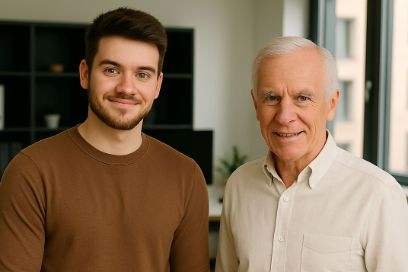Best practice from the engineering sector
The shortage of skilled labour is particularly acute among engineers. As part of the “Continued employment after retirement age” project, BFH asked two companies why they continue to employ staff after they retire, where they deploy the majority and what the benefits are.
Working as a matter of conviction: why retirees at B+S AG Ingenieure und Planer voluntarily continue to work
B+S AG Ingenieure und Planer from Bern currently employs 15 people of retirement age. They do this for a number of reasons, the main one being the preservation and transfer of many years’ experience, which benefits younger colleagues in particular. With their broad network of contacts, their specialisations in certain specialist areas and their high degree of flexibility, they are valuable team members who make an invaluable contribution in coaching or as mentors.
Since they continue to work of their own free will, retirement-age employees display a high level of motivation, innovation and pleasure in their work. For many, continuing to work also means social integration, daily structure and a purpose in life. Financial reasons tend to be less important. They continue to work first and foremost out of an intrinsic motivation. Many are keen to pass on the knowledge they have built up over the years and want to continue to make a contribution to the company. Professional pride also plays an important role – especially among baby boomers. They place a greater value on boldly embracing unconventional ideas and engineering solutions than on advancing their career.
B+S has had consistently positive experiences with employees of retirement age. Instead of rigid regulations, B+S favours individual solutions and actively supports these transitions – always with a view to the needs, health and job satisfaction of each employee. The company benefits from the great flexibility of its retired employees. Many of them work for just a few hours or on an hourly basis and provide specific help when there are bottlenecks. This creates a certain personnel ‘buffer’, which takes the pressure off the recruitment of new staff. The positive attitude of older staff also has a positive impact on the working atmosphere and company culture.
All in all, this results in a clear win-win situation for B+S – both professionally and personally. And because the work is voluntary and can be organised flexibly, many people of retirement age find this phase of their professional career particularly fulfilling.

Experience meets the future: why the Noser Group relies on retirees

At the Noser Group, long-term relationships and individualised solutions are part and parcel of the corporate culture. Accordingly, they also employ people of retirement age. Flexible working models that suit both sides are agreed in an open dialogue. From the company’s point of view, the shortage of skilled labour, the preservation of valuable know-how and the employees’ high level of identification with the company are other benefits – and all key operational reasons. Older staff usually continue to work for pleasure, a sense of purpose and a desire for creative freedom. Financial motives may play a role, but are not the primary factor.
The Noser Group’s experiences with its retirement-age staff has been very positive. They are usually long-serving, well-integrated individuals who identify with the company. They are motivated, flexible and reliable. They often work part-time or take on specific tasks or project work where their experience is particularly in demand. They bring stability and work with a high level of personal responsibility.
Continuing to employ staff past retirement age brings many benefits for the company: the employees’ extensive experience is preserved; everyone is used to working together; and there is no need for recruitment campaigns or time-consuming onboarding. And they are also intimately acquainted with the corporate culture. These are all important advantages in view of the shortage of skilled labour.
The collaboration between different generations is also valuable, as it fosters new perspectives and productive dialogue. The Noser Group sees cultural differences between the generations as an opportunity rather than a problem. It sees itself as a learning organisation, discusses these contrasts openly and actively helps to shape them. Overall, retired employees noticeably strengthen the company through their expertise, reliability and loyalty.